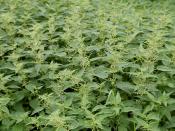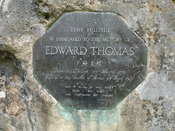The poem 'Tall Nettles' has a positive attitude of power towards nature. This attitude is effectively conveyed by Edward Thomas, who uses the plant "nettles" as a symbol of nature to illustrate his ideas of nature's powers.
The attitude of power towards nature is first conveyed by Thomas' use of the title. The title of the poem is split into two words: "Tall" and "Nettles." The second word "nettles" is a weed which gives off negative connotations of poison. However, due to Thomas' use of the adjective "tall," the nettles are given a sense of power and pride. Overall, we could say that Thomas is effectively conveying the attitude of power here by creating an image in our minds of height, thus telling us that in this poem, height represents power. This image is emphasized in the title by its visual effects. In the title, Thomas uses capital letter at the beginning of each word and the consonance of the letter "l" to visually reflect power by the height of the letters.
The attitude of nature is further conveyed when Thomas metaphorically describes a battle between nature and man-made tools. As mentioned earlier, the word "tall" gives connotations of power. In his description, Thomas tells us that the nettles, as a symbol of nature, are taller than "the harrow, the plough and the roller." By doing this, Thomas gives the impression that these tools, all made from men, are weaker than nature. This also creates a visual image in our minds of the tall nettles towering over the weak man-made tools. To reinforce this image, Thomas uses adjectives with connotations of death to describe the tools. An example of this is when Thomas describes the harrow as being "rusty," thus telling us that the harrow is weak.
More power is added to nature in the poem by giving it strength and a sense of eternity. In the second line of the poem, Thomas tells us that not only are the nettles taller than these tools, but they have been so for "many springs." This tells us that the nettles have been here for years now and will continue to be so. Furthermore, Thomas shows us the strength of the nettles by contrasting them with the plough. By using the words "many springs," connotations of youth and strength are given to the nettles, as spring is the season which represents life and youth. Then, by using the words "long worn out" to describe the plough, connotations of age is given to the plough. By comparison of the nettles and the plough, Thomas has given us the impression that the nettles are stronger than the plough, and where the plough has become old and worn, the nettles remain youthful. When Thomas describes the plough as being "long worn out," he uses monosyllabic words and stresses them. From this, we can say that Thomas really wanted to emphasize this idea of comparing the age of the nettles and the plough.
The image created by Thomas that the nettles are stronger than the farm tools continues to effectively convey the poem's attitude of power towards nature. After the word stone in the third line, there is a colon. This indicates that Thomas is about to expand his ideas on the power of nature and make an important statement. After the colon, Thomas tells us that "only the elm butt tops the nettles now." Sticking with the image of height being power, Thomas has given us the impression that compared to other things in nature, the nettles are not very powerful at all. This is because even an elm tree that has been cut down is still taller than the nettles. However, if we compare the nettles to the man-made tools, they are very powerful. From this, we could say that Thomas is trying to tell us that even the weakest things in nature are still far more powerful than the work of mankind. This image of the power of nature is reinforced when Thomas uses irony and visually contrasts the consonance of the letter "t" in the sentence "...only the elm butt tops the nettles now..." with the consonance of the letter "l" in the title, "Tall Nettles." The consonance of the letter "t" visually reflects that the nettles are not as tall as they used to be. However, Thomas still ironically tells us that even though the letter "l" is taller than the letter "t," the only thing that is still taller than the nettles is the elm tree which men tried to cut down.
Thomas adds attitude of power towards nature by giving us the impression that nature is everywhere. In the first line of the second stanza, Thomas tells us: "This corner of the farmyard I like most." By using the word farmyard, Thomas tells us for the first time that the nettles are not growing in the wilderness where mankind has uninhabited, but that the nettles are growing in the very centre of civilization. This adds to the power of nature as we get the impression of nature being everywhere.
Lastly, Thomas conveys the attitude of power towards nature by telling us that nature may not be changed by anything but nature itself. In the last two lines of the poem, Thomas tells us that the "dust on the nettles is never lost," meaning that they would stay there forever. By this, we get the impression that nature cannot be changed. The words "dust" and "never" also have references to time, adding the sense of eternity to nature as mentioned earlier. In the next line Thomas tells us that the only time the dust can be removed is to "prove the sweetness of a shower." From this, we get the indication that the only exception of removing the dust off the nettles is when there is rain, which is nature itself. By using the word "sweetness," connotations of regeneration are given. This adds further powers to nature as Thomas has just told us that nature also has the power to heal.
From this, we could conclude that Thomas has effectively conveyed that the attitude of the poem towards nature is power, by using the imagery of height to represent power and by metaphorically describing a battle between nature and men. In the last line, the word "sweetness" also personifies nature, telling us that nature works in peace and harmony unless the work of men be foolish enough to change it. Thus, it could be said that nature has many powers, such as healing, strength and eternal youth.


